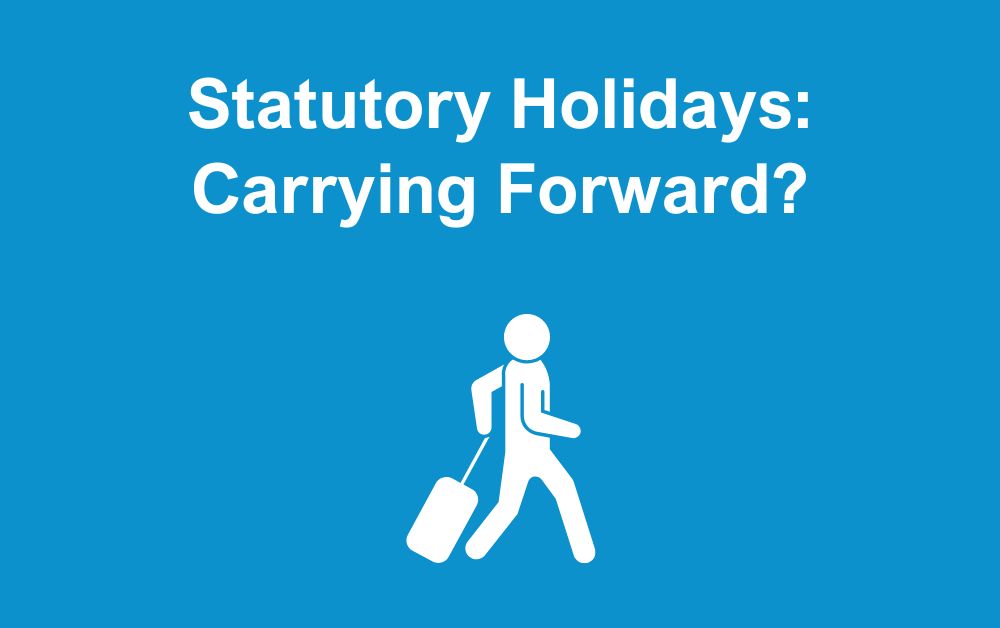Can Unused Statutory Holidays Be Carried Forward To The Next Year?
In the fast-paced world of employment, statutory holidays are a cherished respite from the daily grind. These days off are not just moments to relax and unwind but are also an essential part of employee rights and labour laws. However, there can be instances where these precious days go unused. This leads to an intriguing question: can unused statutory holidays be carried forward to the next holiday year? In this blog post, we will explore this question and relate it to current trending events to shed light on the evolving landscape of employee benefits and rights.
Understanding Statutory Holidays
First, let’s clarify what statutory holidays are. Statutory holidays, also known as public or bank holidays, are days on which the majority of employees are entitled to take a day off with pay. These holidays typically include well-known celebrations such as New Year’s Day, Christmas Day, and national holidays like Independence Day. The specific holidays and rules regarding pay may vary from country to country and even within regions.
Use It or Lose It: The Traditional Approach
Traditionally, the use of statutory holidays was straightforward – you either used them or lost them. If an employee didn’t take a statutory holiday within the designated holiday year, they forfeited their right to that day off. This approach encouraged employees to make the most of their holidays and ensured they had adequate time for rest and relaxation.
However, in recent years, there has been a growing trend towards more flexible employment practices and employee-centric policies. This shift has given rise to the question of whether unused statutory holidays can, or should, be carried forward to the next holiday year.
The Legal Perspective
The legality of carrying forward unused statutory holidays depends largely on the jurisdiction and the specific employment laws in place. In some countries, employees have the right to carry forward unused statutory holidays, while in others, it is not allowed. Employers must be well-versed in the relevant laws to ensure they are complying.
In the UK, for instance, the general rule is that statutory holidays cannot be carried forward to the next holiday year. Any unused holidays typically expire at the end of the holiday year. However, there are exceptions to this rule. For example, if an employee is unable to take their statutory holiday due to sickness, maternity leave, or other reasons, they may be allowed to carry it forward to the next year.
Current Trends and the Pandemic Impact
The COVID-19 Pandemic has had a significant impact on the way we work and our approach to statutory holidays. With lockdowns, travel restrictions, and health concerns, many employees found themselves unable to take their holidays in the usual manner. As a result, governments and employers have had to adapt to the changing circumstances.
In response to the pandemic, some countries temporarily relaxed their rules regarding unused statutory holidays. They allowed employees to carry forward holidays that could not be taken due to COVID-19 related issues. This was a necessary measure to accommodate the unprecedented challenges faced by both employers and employees during the pandemic.
The Working Time Regulations 1998
The Working Time Regulations of 1998 have undergone amendments effective from January 1st, 2024, which clarify certain situations allowing employees to carry forward their holiday entitlement. According to the revised regulations, employees can carry:
- Their entire 5.6 weeks’ holiday entitlement into the following leave year in cases where they are unable to utilise it due to being on maternity leave or other forms of family leave.
- Their four weeks’ entitlement, which must be taken within 18 months after the end of the leave year in which it was earned, if they cannot use it because of long-term sickness absence.
Additionally, the regulations state that if an employer fails to:
- Recognise their employees’ right to paid statutory annual leave.
- Provide a reasonable opportunity for employees to take the leave or actively encourage them to do so.
- Inform employees that any remaining leave, which cannot be carried forward, will be forfeited at the end of the leave year,
… then employees have the right to take action in relation to their unutilised holiday entitlement.
As we move forward, it will be essential to strike a balance between the evolving needs of employees and the operational requirements of businesses. Flexibility in holiday policies may become a key component of employee satisfaction and well-being.
In the current landscape, where remote work and flexible working schedules are increasingly common, the question of carrying forward unused statutory holidays is just one example of how employment practices are adapting to the times. As we continue to navigate the challenges of the modern workplace, it is essential to keep an eye on trends and developments that shape the future of employee benefits and rights.







